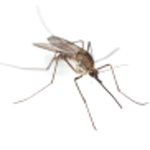Biology

Mosquito “Anopheles sp.”
Mosquitoes or “Gnats” belong to the family of Culicidae (Culex in latin meaning midge or gnat). The mosquitoes are divided in two main groups: The Anophelines and the Culicines.
Anopheline mosquitoes are 10mm long and have a wingspan of about ~20mm. Mosquitoes need a suitable body of water for breeding and larvae breathe through a pair of spiracles when they are suspended just below the surface. Their diet consists of vegetable debris and algae. Favorable breeding sites include stagnant pools and ponds or brackish water. It is only the females that require a blood meal for breeding, whilst males feed on flowering plants only.
The Culcine mosquitoes are the most prominent blood taking species in the UK and include the Gnat (Culex sp. and Aedes sp.). They are significantly smaller than the anopheline mosquitoes.
Particularly the Culex sp. are associated with dirty stagnant pools and drains near buildings and considered the most prominent biting & nuisance “urban” mosquito species linked with human activity, especially during the summer months.
Marsh species include Aedes sp. and are associated with coastal regions where they will attack several miles from their breeding grounds.
Disease transmission by mosquitoes
Malaria, an eukaryotic protists of the genus Plasmodium, is is one of the most prominent disease transmitted by Anopheles sp. of mosquitoes and responsible for the death of ~1 million individuals annually. The UK version of malaria (named “ague”) was a prominent disease in the East coast counties of England and Scotland in the 18th and 19th century and transmitted by Anopheles atroparvus. Reoccurrence of this disease in the future is not unlikely, in light of climate change.
Mosquito Control
Effective control of mosquitoes, especially near buildings, is the management / drainage of bodies of stagnant water. Conventional insecticides cannot be used, as they are extremely toxic to all aquatic life. Currently there is a biological agent; Bacillus thuringiensis var israeliensis (Bti), which is approved for mosquito control in ponds and/or marshes. Other methods of preventing mosquito access include insect screening of doors and windows
